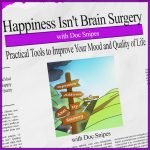
100+ Practical Tools to Defeat Depression
Physical Interventions
Dr. Dawn-Elise Snipes, PhD, LPC-MHSP, LMHC
Executive Director, AllCEUs Counseling Education
Podcast Host: Counselor Toolbox, Happiness Isn’t Brain Surgery
Objectives
~ Identify why physical interventions are important to recovery and happiness
~ Explore different physical interventions
Intro
~ There are a myriad of reasons why physical interventions are so helpful in treating depression and anxiety.
~ They release endorphins, serotonin, dopamine and norepinephrine (all happy chemicals)
~ They increase the available oxygen in your blood (helps with confusion and ”foggy head”
~ They have been linked to improvements in self-esteem
~ They help you get your mind/thoughts and bodily reactions more in synch.
~ They often put you in a place where you can engage with other positive people
~ They can help with general aches and pains which can disrupt your sleep and put you in a bad mood.
~ They can help you turn down the stress response, so you sleep better
~ They can help increase your energy
Relaxation
~ Yoga
~ Your calming brain chemical, GABA, increases after a session of yoga
~ Produces significant improvements in tension-anxiety, depression-dejection, anger-hostility, fatigue-inertia, and confusion-bewilderment.
~ Group or individual activity: Breath focus; Cued progressive muscular relaxation
~ Meditation
~ Quiets the mind
~ Singular, all-encompassing present focus
~ 20-30 minutes of meditation per day produces consistent effects on anxiety and depression
~ Consider adding a fish tank or similar to your waiting room
~ Experiment with different types of meditation over several sessions
Relaxation
~ Exercise
~ Physical activity helps balance muscles, release muscle tension, increase oxygen flow, increase serotonin and improve sleep.
~ Activity: Identify 10 ways to make exercise fun
~ Group activity: balloon toss, learn a dance, nature walk
~ Stretching
~ Muscle imbalances cause additional pain and can impair sleep and mood as well as keep stress chemicals high.
~ Imbalances between front and back or right and left can cause pain.
~ Group activity: Stretch
Relaxation
~ Hobbies
~ Can help you use up some of the “nervous energy”
~ Enable you to get into a calm mind space
~ Cooking
~ Building
~ Planting
~ Crocheting
~ Reading/writing
~ Can help you get “out” some of your stress
~ Painting
~ Yardwork
~ Construction (demolition)
~ Activity: Share hobbies, Hobby stations or segments
Nutrition
~ Your body needs building blocks to make the brain chemicals that help you feel motivated, happy, and, yes, even stressed.
~ It gets these building blocks from good healthy food.
~ Taking vitamins is not a replacement for a healthy diet, but some people on restrictive diets may need supplements. (Consult a physician.)
~ Malabsorption syndromes, such as celiac disease, Crohn's disease, and ulcerative colitis can cause vitamin B6 deficiency which impairs serotonin production
~ Some biological causes of depression can be linked to poor nutrition which keeps the body from being able to make the brain chemicals to support your mood
~ Activity: Create a menu
~ Activity: Identify creative ways to sneak in green vegetables
~ Activity: Potluck
Sleep
~ Sleep is the time when your body rests and rebalances
~ Lack of sleep results in your body being under stress and releasing extra cortisol
~ Activity: Develop a sleep routine
~ Activity: What helps you sleep
~ (Note: Dispel myths about antihistamines and alcohol)
Pain Management
~ Pain causes increased cortisol levels, impairs sleep and often creates an irritable mood
~ Pain can be caused by
~ Injury/illness
~ Muscle imbalances and pain
~ Purse/backpack
~ Incorrect exercise habits
~ Repetitive physical labor
~ Poor ergonomics
~ Stress
Pain Management
~ Interventions
~ TENS
~ Hottub/Heat
~ Ice
~ Stretching
~ Muscle rebalancing
~ Massage
~ Guided imagery
~ Stress reduction (increases serotonin and reduces muscle tension)
Nutrition, Sleep and Pain Management
~ Play Family Feud
~ Create a board for each of the following questions and any you make up
~ Each response on the board is worth 1 point.
~ During the initial face-off, whoever answers correctly first gets control of the board for their team.
~ If a team identifies all answers correctly in a category, they get 15 bonus points.
~ Any answers that are not chosen, reveal them at the end of the round and explain them.
~ If a team strikes out, the other team gets an opportunity to respond. If they do so correctly, they get the point and retain control of the board.
Nutrition, Sleep and Pain Management
~ Play Family Feud
~ What are 5 things you can do to improve sleep?
~ What are 5 essential oils to help with sleep?
~ What are 5 things you should not do before bed
~ What are 5 things you can do to improve your nutrition?
~ What are 5 good sources of B-vitamins?
~ What are 5 things you can do to help you relax?
~ What are 5 non-drug ways you can manage pain?
~ What are 5 causes of muscle pain?
~ What are 5 fun types of exercise?
Summary
~ A healthy body is necessary to feel your best emotionally
~ Brain chemicals that help you feel happy and relaxed are created from the foods you eat
~ Sunlight sets your circadian rhythms so you get quality sleep and produces vitamin D which helps relieve depression
~ Exercise, stretching and yoga can all help increase the happy chemicals, reduce pain and improve sleep.
~ Pain is a fact of life. There are many options for pain management other than drugs. (Many pain medications are system depressants)
